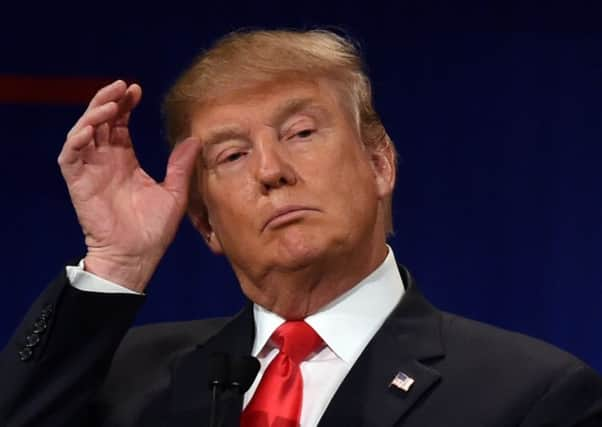Dani Garavelli: UK ban gives Donald Trump the last laugh


Right now, Salmond doesn’t need others to make him look foolish; he is doing a perfectly good job of it on his own. There he is on LBC Radio, a bumptious parody of his bumptious self, fielding calls in a jocular, tipsy-uncle-at-a-party style. For months now, Salmond and Trump have been behaving like estranged lovers, still bitter over how it all went wrong. Having endured an acrimonious split, they remain obsessed by each other, unable to resist trading insults while everyone else stares at the floor.
Last week, asked about the US billionaire, the former first minister made a fatuous comment about Trump’s toupee before calling on him to give up his ownership of Turnberry and agreeing that – yes – this hate-monger should be banned from our shores. He doesn’t seem to understand that every time he criticises Trump - for opposing wind farms, for over-stating his investment in Aberdeenshire, for fomenting Islamophobia – he calls his own judgment into question. As for the parliamentary debate, which has come about because a petition calling for a ban garnered 560,000 signatures and carries no mandate, isn’t it just an easy way for MPs to flaunt their liberal credentials without having to tackle the more complex issues around immigration, radicalisation and growing intolerance towards Muslims at home?
Advertisement
Hide AdAdvertisement
Hide AdIt’s similar to the way we tout Nadiya Hussain winning the Great British Bake Off (with a wedding cake wrapped in a sari in the colours of the Union Jack) as evidence of our multi-culturalism, while glossing over some of the more insidious racism that manifests itself in, for example, posts to SNP minister Humza Yousaf’s Facebook and Twitter accounts.
Of course, Trump’s views are antithetical to the values of our country. No-one doubts his call for all Muslims to be banned from entering the US –made at a time of intense racial volatility – was utterly unacceptable. And we have plenty of our own bigots to contend with without importing them from other countries. Only last week, Katie Hopkins wrote a column criticising English education authorities for taking Ramadan into account when they draw up next year’s exam timetables. In November, Richard Dawkins touted his anti-Islamic opinions on Bill Maher’s HBO show.
There is also plenty of precedent for preventing “undesirables” from crossing our Border. Regardless of the UK’s stance on freedom of speech, it has regularly barred entry to high-profile figures whose views it opposes: communists, including composer Dmitri Shostakovich and poet-diplomat Pablo Neruda, cult leaders, including Sun Myung Moon of the Moonies and Indian “guru” Bhagwan Shree Rajneesh, and right-wingers, including Fred Phelps of the Westboro Baptist Church and chat-show host Mike Savage, have all been outlawed. In the past few years, radical Islamic preachers have been refused entry, but so have those speaking out against Muslims. Pamela Geller and Robert Spencer were banned from attending an English Defence League rally in Woolwich, where Drummer Lee Rigby was murdered.
Trump’s views have already been challenged in the UK, with David Cameron calling them “stupid and wrong”. However, Trump is not the only western politician to take up an odious position on immigration. Last year, the Hungarian government put a fence across its border and Denmark’s ruling Liberal Party is trying to introduce a law which would allow them to seize refugees’ valuables to finance their stay.
Wouldn’t banning the Republican front-runner at this point in his campaign simply be grist to his mill? Isn’t it more productive to keep on treating him as a buffoon than as a potential threat? Also we have to be pragmatic. What happens if – heaven forfend – he becomes president? How are we going to conduct diplomatic relations with a man we have told never to darken our door again?
Banning things (like signing petitions) is an option we seem increasingly willing to take, perhaps because it is less taxing than engaging in the argument. We can laugh at the Scottish Resistance group boycotting Tunnock’s teacakes, but their stance is just an exaggeration of what is going on elsewhere. Look at Oxford University where students are campaigning to have a statue of British imperialist Cecil Rhodes taken down, as if this would somehow erase the history he represents. You cannot rewrite a chequered past by removing the evidence of it from view.
The same applies to Trump: we will not silence him by banning him. If anything we will hand him an even bigger platform. And, by trying to take the moral high ground, we will imply the UK is somehow above his type of bigotry instead of facing the same upsurge in Islamophobia as elsewhere.
Let Trump come here and make even more of a laughing stock of himself. Meanwhile, if we want to turn the whole thing into a morality lesson, we should remember that, not so long ago, we were prepared to overlook Trump’s little “idiosyncrasies” in exchange for a piece of his business action. And learn from that.